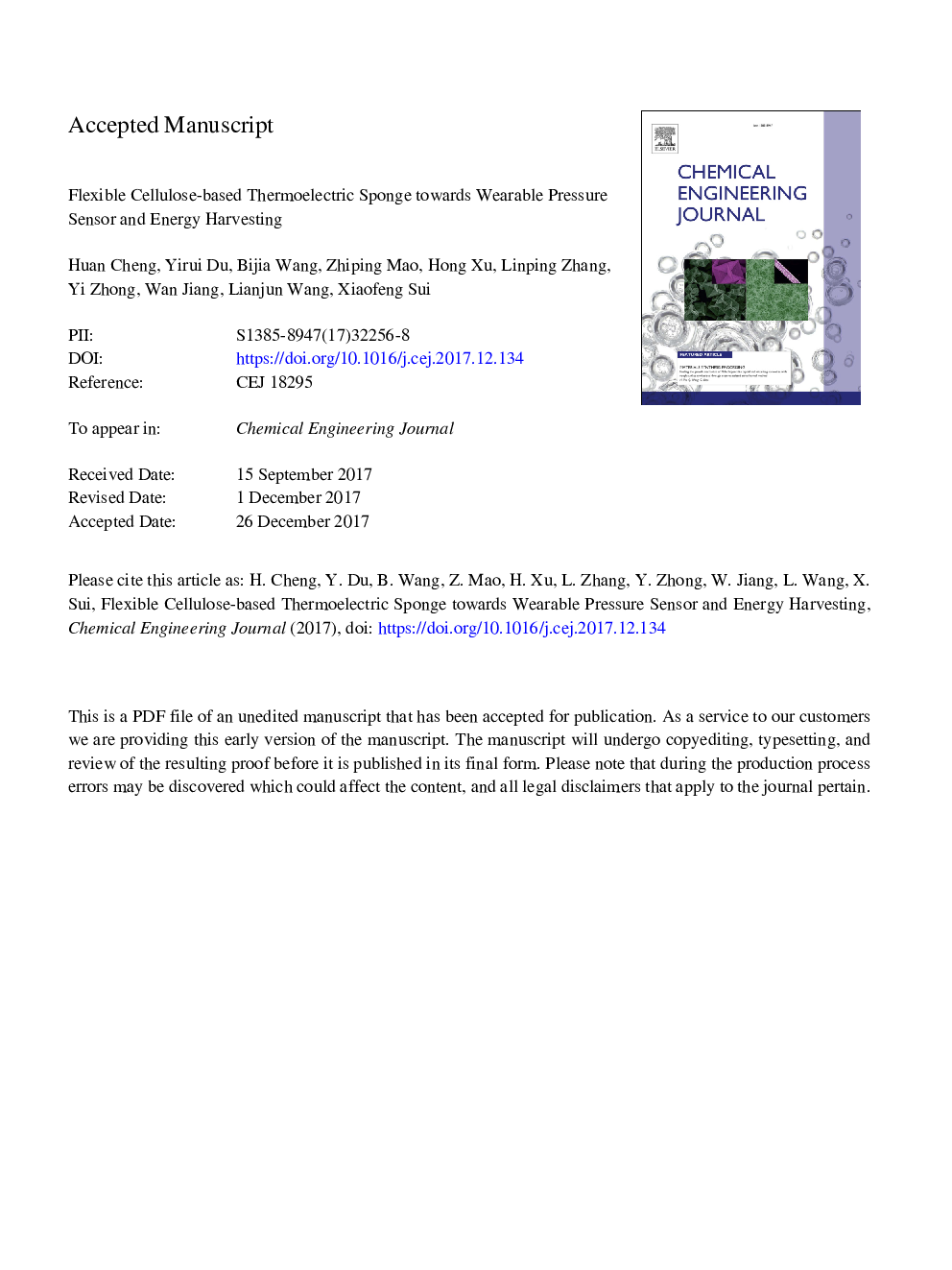| کد مقاله | کد نشریه | سال انتشار | مقاله انگلیسی | نسخه تمام متن |
|---|---|---|---|---|
| 6580328 | 1422940 | 2018 | 18 صفحه PDF | دانلود رایگان |
عنوان انگلیسی مقاله ISI
Flexible cellulose-based thermoelectric sponge towards wearable pressure sensor and energy harvesting
ترجمه فارسی عنوان
اسفنج ترموالکتریک مبتنی بر سلولز انعطاف پذیر به سمت سنسور فشار پوشاننده و برداشت انرژی
دانلود مقاله + سفارش ترجمه
دانلود مقاله ISI انگلیسی
رایگان برای ایرانیان
کلمات کلیدی
قابل انعطاف، ترموالکتریک، اسفنج سلولز، پیتزورزیستی، لایه لایه،
موضوعات مرتبط
مهندسی و علوم پایه
مهندسی شیمی
مهندسی شیمی (عمومی)
چکیده انگلیسی
Self-powered electronic sensors and devices are suitable for use in applications such as health monitoring and information collection under battery-free conditions. Thermoelectric (TE) materials can utilize the temperature difference between the body and environment to achieve self-power. In this work, a flexible cellulose-based TE sponge (CP:PP sponge) was prepared via the electrostatic assembly of poly(3,4-ethylenedioxythiophene):poly (styrene sulfonate) (PEDOT:PSS) on cellulose sponges crosslinked with branched polyethylenimine (CP sponge). X-ray photoelectron spectroscopy (XPS) confirmed the adsorption of the PEDOT:PSS onto the CP sponge. The 3D structures, which were composed of thin sheets, typical of cellulose sponges, were maintained within the CP:PP sponges. These CP:PP sponges exhibited reasonable piezoresistive characteristics and excellent flexibility. Upon the application of several press-release cycles, the resistance varied without attenuation. It was demonstrated that the electrical conductivity of the sponge could be enhanced from 2â¯mS/cm to 6.7â¯mS/cm via further assembly of the PEDOT:PSS using an immersive layer-by-layer (LbL) strategy, and the thermal conductivity was maintained as 0.0449â¯W/mK. The maximum figure-of-merit (ZT) value was 1.88â¯Ãâ¯10â6 at 310â¯K. A TE generator was fabricated by sandwiching the as-prepared CP:PP sponge, with enhanced electric conductivity and inherent low thermal conductivity, between commercial cotton fabrics. At an ambient temperature of 291â¯K, the device was shown to generate a voltage of 0.3â¯mV when one side of the device was attached to forearm skin (307â¯K). Such CP:PP sponges could potentially be used in artificial intelligence products or remote medical monitoring devices as general, flexible thermal energy harvesting materials.
ناشر
Database: Elsevier - ScienceDirect (ساینس دایرکت)
Journal: Chemical Engineering Journal - Volume 338, 15 April 2018, Pages 1-7
Journal: Chemical Engineering Journal - Volume 338, 15 April 2018, Pages 1-7
نویسندگان
Huan Cheng, Yirui Du, Bijia Wang, Zhiping Mao, Hong Xu, Linping Zhang, Yi Zhong, Wan Jiang, Lianjun Wang, Xiaofeng Sui,
